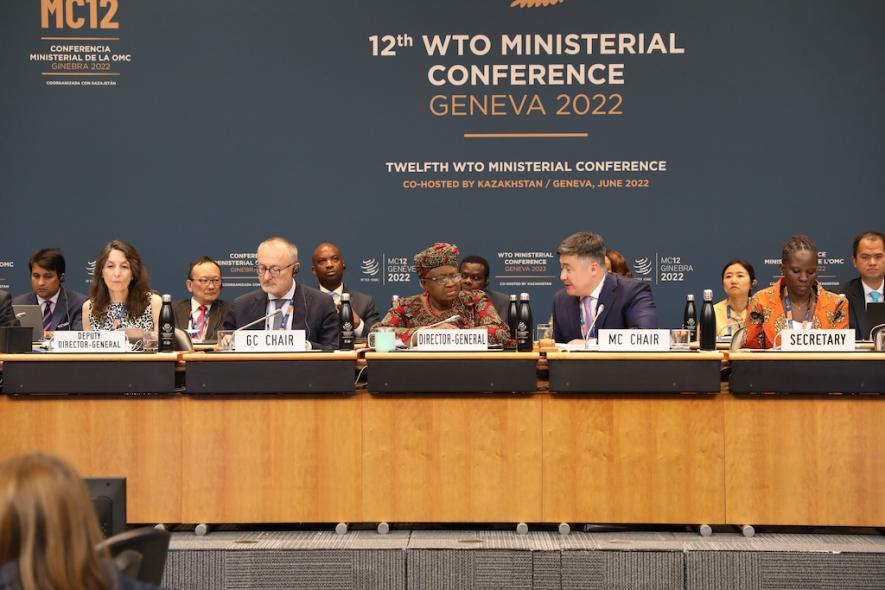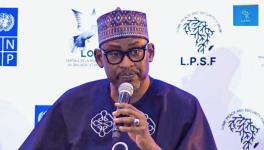Death Trumps Life at Geneva Ministerial

A meeting of Heads of Delegations attended by DG Okonjo-Iweala, General Council Chair Didier Chambovey and MC12 Chair Timur Suleimenov, 14 June 2022. ©WTO/Jessica Genoud
On 2 June, days before the 12th Ministerial Conference of the World Trade Organisation, Winnie Byanyima, executive director of UNAIDS, warned the world of a grim future without patent waivers. “In a pandemic, sharing technology is life or death, and we are choosing death,” she said at a press conference. But at the 12th WTO ministerial in Geneva, which ended on 17 June, the rich countries did precisely that. They blocked almost all possibilities of providing cheap vaccines, antivirals and diagnostics to the world.
After two years of “postponing”—blocking—the joint India-South Africa proposal at the WTO to waive patents for Covid-19 vaccines and medicines, the club of rich countries—the European Union, United States and the United Kingdom—ensured no worthwhile patent waiver measure passes. The profits of Big Pharma have once again trumped people’s lives and health, as it had during the HIV-AIDS epidemic.
The so-called “concessions” accepted in this ministerial simplify some cumbersome compulsory licensing procedures of the Doha Declaration. But they also make it much more difficult for countries like India and China, with considerable manufacturing capacity, to supply vaccines under such licenses. So, yes, countries that want vaccines can issue compulsory licenses more easily—but to whom, if not countries with the capacity to manufacture them?
It is not the “formulae” of vaccines that matter in their manufacture. Unlike many medicines, which are small chemical molecules and therefore easily patented, vaccines are large molecules. They belong among what are called biologics. The key to manufacturing them is not the “formulae” of the compounds but the ability to produce them at an industrial scale, in a production process that must replicate complex large molecules accurately. This is “know-how”, guarded not under patent law but as trade secrets. Not that trade secrets cannot be duplicated or secured by giving somebody who knows the process a job—but doing so opens companies who try it to costly legal action, including at the WTO. Quite apart from the threat of unilateral sanctions by the United States, the European Union and the United Kingdom.
The upshot is that Pfizer and other Big Pharma will continue making windfall profits at the expense of people’s lives. Even if the ongoing pandemic leads to the emergence of new variants of SARS-CoV-2, the virus that causes Covid-19, and continues the pandemic. Less than 20% of Africa, with 700 million habitants, are fully vaccinated, while vaccine doses go a-begging in the United States. The world has the capacity to produce vaccines to immunise the entire global population. Doing so would save countless lives and reduce the possibility of new, dangerous variants, but these are not in the interest of Big Pharma, for which profits matter far more than human lives.
For perspective, Pfizer’s profits roughly doubled during the pandemic, with the Pfizer-BioNTech vaccine providing a significant share of the gains. If Pfizer were a country, its $81 billion earnings last year would have placed it ahead of the GDP of large countries such as Ethiopia, Ghana and Kenya! Not just vaccines. The monopoly over diagnostics and antiviral drugs also pushes the costs up for people while generating windfall profits for Big Pharma.
The only waiver in the Geneva Ministerial was on compulsory licenses for vaccines. It did not address patents on diagnostics and antiviral drugs. It also did not address other inclusions in the waiver raised at the WTO, such as waivers for trade secrets, which are essential to mass-produce vaccines.
The 12th Ministerial has kicked the ball on diagnostics and antivirals six months down the line, and there is a very small chance that rich countries would have a sudden change of heart at that point. They have not over a two-year pandemic that has killed millions already.
Why is immunising the global population important? Put simply, the more people SARS-CoV-2 infects, the higher the chances of more new variants. There is a feeling of comfort among a section of people that the more the virus mutates, the more benign it will likely become. It used to be the common opinion among a section of the medical community. However, today evolutionary biologists hold there is no evidence that viruses mutate to become more benign. Even if it is true in the “long run”, as John Maynard Keynes put it, “In the long run, we are all dead!” And a long biological run can be a very long run indeed.
The more we live with a pandemic that infects half a million to a million people on a daily basis, the more we play dice with the possibility of a new variant, possibly as transmissible as the Omicron variant—and which can inflict more fatalities. A virus has maximum transmissibility when an infected person has mild symptoms and is physically and socially mobile, and can, therefore, infect others. When this window opens, the virus spreads. Whether a patient recovers or dies from the infection has little impact on the replication of the disease in others who get infected. Also, being infected may impact our social behaviour, but it has little to do with the virus becoming more benign with time.
We, people, do generate more immunity to a virus over time, but then that is what drives its evolutionary path. If the Delta variant of SARS-CoV-2 showed higher transmissibility, the Omicron variant has a much higher immune escape. Omicron, in other words, can bypass the immunity we derived from earlier infections or the vaccines. Of course, if the virus evolves to making those it infects so sick, right from the beginning, that they cannot move around at all, that would halt or lower its transmission. But that is not how SARS-CoV-2 behaves.
How is SARS-Cov-2 likely to evolve over the next few years? Immunologists tell us the evolutionary trajectory of the virus depends on a complex interplay of numerous factors, which, in turn, shape our immune response to the evolution of the virus.
Depending on the virus turning more benign (or mythical herd immunity) is not the answer to this pandemic. Vaccines are crucial to any public health response, as they cut the number of new infections and, therefore, new transmissions at their root. Yes, in the foreseeable future, we must live with repeated booster vaccine doses as we fine-tune vaccines to newer variants.
While patents on antivirals as a cure for Covid-19 are important, they will certainly cut deaths and complications of long Covid. Again, patents come in the way of actually using them. Antivirals are effective only during a small window of the first few days of the disease, which means they have to be available cheaply so people can buy them from chemists. High costs and controls over the patents on these drugs do not allow a large enough market. But a small market with high-priced antivirals creates a Catch-22 situation: prices are high because the market is small, and the market is small since the prices are high!
Open licensing of antivirals might make it possible to create a large market for antivirals. But this is what the WTO does not allow. The WTO compulsory licensing route is a cumbersome process, and the way it has been “relaxed” in the Geneva Ministerial means countries like India—crucial during the fight against the HIV-AIDS epidemic—are supposed to opt-out as suppliers. They cannot become antiviral suppliers for Covid-19 as they were for the HIV-AIDS antiviral drugs.
Why do not countries with the capacity to manufacture advanced vaccines—India, China, Russia, South Africa—come together and offer technology and supplies to the rest of the world? Why do not countries collaborate with Cuba, a biologics powerhouse, to locally produce vaccines? Cuba has developed four such vaccines, two already in large-scale production.
The answer lies in the “rules-based international order” propagated by the club of the rich. The rules include sanctions on many countries, including Russia, Cuba and China. For those not under sanctions yet, there is the threat of future sanctions by the United States, European Union and United Kingdom—the gang of three who teamed up to defeat the India-South Africa TRIPS waiver initiative at the WTO.
The United States also has a domestic law, Section 301 of its Trade Act, to “protect” its intellectual property, which it uses to threaten countries with sanctions. Every year, India and China figure prominently in the list of countries whose laws and actions do not conform to United States domestic laws. If the United States and its allies do not win at the WTO, they use their “rule-based order”, in which they get to make the rules. And if it is the United States, then its domestic laws, according to even its courts, trump international law.
Welcome to our brave new world, where, to paraphrase Winnie Byanyima, death triumphs over life
Get the latest reports & analysis with people's perspective on Protests, movements & deep analytical videos, discussions of the current affairs in your Telegram app. Subscribe to NewsClick's Telegram channel & get Real-Time updates on stories, as they get published on our website.
























